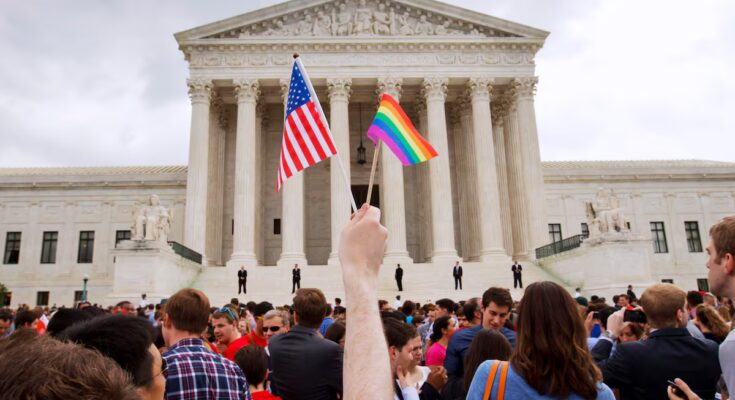The U.S. Supreme Court on Monday rejected a former Kentucky official’s lawsuit seeking to overturn the nationwide legalization of marriage equality, which passed in 2015 after a landmark ruling. Obergefell vs. Hodges). The high court, which has a six-to-three conservative majority, rejected the appeal of Kim Davis, a former Kentucky county clerk who was sued by a gay couple for refusing to plan their wedding. “The request for review (of the case) is denied,” the Supreme Court said. Although he did not provide details on his decision, at least four of the judges on the panel were opposed to considering Davis’ case.
For Jim Obergefell, whose cause led to national passage of marriage equality in the United States, Davis’ case is personal. In an interview with The lawyer He said he felt “disgusted” that there are fellow citizens working against the well-being and happiness of other people, using religious freedom as an excuse. “This modern version of religious freedom – this belief that one’s personal religion is above all else – is a distortion and a perversion of what our founders intended,” he said. Furthermore, Obergefell noted that Davis’ refusal to follow the law was symptomatic of a larger problem: that of public officials putting their private faith before civic duty. “(Davis) swore an oath to serve all people, yet he used his public office to persecute others.”
Three years ago, a federal judge, David Bunning, had already rejected Davis’ arguments, Reuters recalls: “You cannot use your constitutional rights as a shield to violate the constitutional rights of others while carrying out your duties as an elected official.”
Despite the 2015 Supreme Court ruling that granted legal protection to marriage equality in all U.S. states, Davis argued that this rule conflicted with his religious beliefs. The former official had already appealed to the lower courts, which not only rejected her requests, but also convicted her of violating fundamental rights (she spent five days in prison and was fined over 300,000 euros). Furthermore, five years ago, the Supreme Court had already rejected another appeal by Davis.
The former official, who worked at the Kentucky Registry, asked the Supreme Court not only to appeal his convictions but also to change the ruling in the Obergefell case. Intentions which for the legal head of Glaad (Gay and Lesbian Alliance Against Defamation), Josh Rovenger, had little chance of success: “It would be truly anomalous for the Supreme Court, with such limited facts, to review Obergefell”, he observed in The lawyer last week
In 2022, the conservative majority of the Supreme Court, which has three Trump-appointed justices, revoked national abortion protections, leaving legislation in the hands of the states. Then, the Supreme Court overturned the historic ruling that protected abortion throughout the United States (Roe v. Wade 1973). After that decision, numerous conservative-controlled states passed laws vetoing this women’s right. Now it was feared that the same thing might happen.
After the nullification of abortion rights protections, consolidated more than half a century ago, ultra-conservative factions in the United States hoped that the Supreme Court would not only consider Davis’ case, but would end up nullifying the national protection for equal marriage, opening the door to state vetoes.
This year, 616 anti-LGTBIQ+ state bills have been introduced (from Idaho to Montana, via Arkansas, Texas or Iowa), according to a count carried out by the American Civil Rights Union (ACLU). Of these, 71 have been consolidated into law, while 248 have been rejected and 285 are still in the parliamentary process. Even if many of these are rejected, the mere proposal fuels LGBT phobia, according to the group’s advocacy organizations.
For his part, Davis’ lawyer, Mathew Staver, assured that Liberty Counsel, an organization of which he is a member and which promotes “evangelical Christian values”, will continue to work to reverse the trend Obergefell v. hodges, a ruling that he defines as “wrong from the start”. “The question is not whether this will happen, but when the Supreme Court will overturn Obergefell,” he said in a statement.



